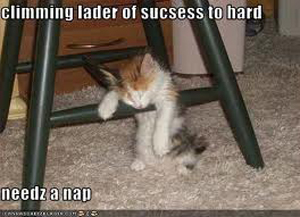In my previous post, I mentioned how one of symptoms of the fixed mindset is perfectionism which can lead to procrastination. It’s one thing to tell yourself that you are now adopting a growth mindset but quite another thing to actually follow through with it. The best method of adopting a growth mindset is to allow yourself to grow into it. You need not be perfect. Rejection Therapy is an excellent way to get used to being rejected.
One of the ways in which Jason Comely recommends we practice Rejection Therapy is through the Rejection Game. The object of the game is to get rejected. That’s how you win! It doesn’t have to be huge. Check out my second blog post again if you need tips on how to go about doing this.
I know I sound like a bit of a broken record, so here are some new tips on how to beat procrastination. One of the excuses that many people make when it comes to getting stuff done is lack of time. The old “if only there were more hours in a days” cliché is a variation of this sort of thinking. In her book 168 Hours: You Have More Time Than You Think by Laura Vanderkam, the myth of being too busy is scrutinized. Turns out many of us aren’t using our time as wisely as we could be. So that whole “who has time to hit the gym” or “I have no time for side projects, I’m way too busy” is shown to be entirely bogus. In her book, she suggests a subtle but powerful paradigm shift: instead of thinking we only have 24 hours in a day, prioritize your work week and say think that we have 168 hours in the week. It might not seem like much on the surface, but putting it into practice shows it to be quite powerful. She has activity sheets on her website, one of which records our every action every half an hour for a full week. Are you really using your time wisely? Or are internet cats taking up way too much time in your daily life?
Why am I talking about time management when all I have talked about lately is rejection? Because all those projects and hobbies that you keep putting off in your life can lead to happiness and satisfaction in life.


